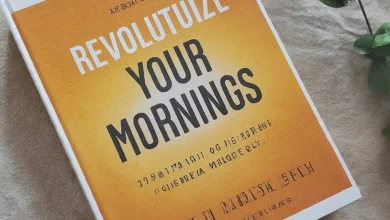The Evolution of Morning Routines: Adapting as You Age

Introduction: The Power of Morning Habits
Do you feel like your morning routine isn’t working anymore? You’re not alone. As we age, our morning habits need to change too. Let’s explore how to adjust our daily routines to fit our changing needs.
Think about this: At 25, you might have jumped out of bed at 5 AM for a workout. Now, 30 years later, you might prefer a quiet coffee while reading the news. What changed? You did. And your morning routine should change too.
Morning routines are crucial. They’re like a good pair of shoes – they need to fit just right for each stage of life. As we age, our priorities, bodies, and daily tasks all change. We need to be smart about how we start our days.
Why Good Morning Habits Matter
A good morning routine does more than just start your day. It sets the tone for how you’ll feel and act all day long. It’s like a springboard for a great day.
Here’s why morning routines are so helpful:
- They boost productivity
- They improve mental health
- They enhance physical well-being
- They help balance work and life
- They reduce daily stress
These routines are powerful tools. They can help you feel more in control, focused, and ready for any challenges.
Adapting Your Routine as You Age
As you get older, your routine needs to change too. What worked at 20 might not work at 40 or 60. Your body, responsibilities, and goals all change. That’s why it’s important to adjust your morning habits as you age.
Think of your morning routine like a toolbox. As you age, you’ll need different tools to build a good day. In your 20s, you might focus on energy and ambition. In your 50s, health and balance might be more important.
The key is to create a routine that fits your current needs. It should help you reach your goals. Don’t copy someone else’s routine. Find what works best for you right now.
Morning Routines in Your 20s
Your 20s are often filled with energy and ambition. This decade is about exploring, learning, and setting the foundation for your future. Your morning routine should reflect this vibrant stage of life.
Common Habits and Priorities:
- Early rising: Many in their 20s find they can wake up early and feel refreshed.
- High-intensity workouts: Your body can handle more intense exercise at this age.
- Career focus: Mornings might include preparing for work or job hunting.
- Social media check: Staying connected is often a priority for this age group.
Balancing Energy and Ambition:
In your 20s, you might feel like you can do it all. However, it’s important to create a routine that energizes you without burning you out. Here are some tips:
- Set consistent wake-up times, even on weekends.
- Start with a glass of water to rehydrate your body.
- Include some form of movement or exercise.
- Eat a nutritious breakfast to fuel your day.
- Take a few minutes for goal-setting or planning.
Transitioning to Your 30s
As you enter your 30s, you might notice some changes. Your energy levels might shift, and your priorities may evolve. It’s time to adapt your routine to fit your changing life.
Shifting Priorities and Responsibilities:
- Career advancement: Your focus might shift from job-hunting to climbing the career ladder.
- Family planning: Some may be thinking about or starting a family.
- Financial stability: Saving and investing might become more important.
Adapting Routines for Growth:
Your 30s are often about finding balance. Here’s how your morning routine might change:
- Wake up slightly later: You might need a bit more sleep now.
- Gentler exercise: Consider yoga or a brisk walk instead of high-intensity workouts.
- Mindfulness practices: Add meditation or journaling to start your day centered.
- Healthy breakfast: Focus on nutrition to maintain energy throughout the day.
- Quick news scan: Stay informed, but don’t let it overwhelm your morning.
Incorporating Self-Care:
Self-care becomes crucial in your 30s. Here are some practices to consider:
- Skincare routine: Take time to care for your skin.
- Quiet time: Enjoy a few minutes of solitude before the day begins.
- Gratitude practice: Start your day by noting what you’re thankful for.
- Stretching: Keep your body flexible and prevent stiffness.
Remember, these are general guidelines. The best routine is one that works for you. As you transition from your 20s to your 30s, be open to adjusting your habits. Listen to your body and mind, and don’t be afraid to experiment with different morning activities.
Mid-life Morning Rituals (40s and 50s)
As we enter our 40s and 50s, our morning routines often need another significant shift. This period of life brings new challenges and opportunities, requiring us to adapt our daily habits once again.
Focusing on Health and Wellness
In mid-life, health becomes a top priority. Your morning routine should reflect this:
- Gentle exercise: Start your day with low-impact activities like yoga, swimming, or brisk walking.
- Stretching: Spend time loosening up your muscles to improve flexibility and reduce stiffness.
- Healthy breakfast: Focus on nutrient-rich foods to support your changing metabolism.
- Vitamins and supplements: Consult with your doctor about adding these to your morning routine.
Balancing Family and Personal Needs
Many people in this age group are juggling multiple responsibilities:
- Family care: You might be helping kids get ready for school or caring for aging parents.
- Work commitments: Career demands often peak during these years.
- Personal time: It’s crucial to carve out moments for yourself.
A balanced morning routine might look like this:
- Wake up 30 minutes before the rest of the household.
- Enjoy a quiet cup of coffee or tea.
- Do some light stretching or meditation.
- Help family members start their day.
- Prepare a healthy breakfast for yourself.
- Review your schedule for the day.
Strategies for Maintaining Energy and Vitality
As we age, maintaining energy becomes more challenging. Here’s how to boost your vitality:
- Hydrate early: Drink a glass of water right after waking up.
- Natural light exposure: Spend a few minutes outdoors to regulate your circadian rhythm.
- Power naps: If possible, a short mid-morning nap can boost alertness.
- Mindfulness practices: Regular meditation or deep breathing can reduce stress.
Comparing Habits: 30s vs. 40s/50s
Here’s a quick comparison of how morning habits might change:
| Habit | 30s | 40s/50s |
|---|---|---|
| Wake-up time | 6:30 AM | 6:00 AM |
| Exercise | 30-min run | 20-min yoga or walk |
| Breakfast | Quick smoothie | Sit-down, balanced meal |
| Mind exercise | Check emails | Read news or book |
| Self-care | Quick shower | Longer grooming routine |
Remember, these are general guidelines. The best routine is one that suits your individual needs and lifestyle. Don’t be afraid to experiment and adjust your routine as needed.
Golden Years: Morning Routines for 60+
As we enter our 60s and beyond, our morning routines often shift to emphasize leisurely starts, mindfulness, and overall well-being. This stage of life offers new opportunities to prioritize health, personal interests, and social connections.
Emphasizing Leisurely Starts and Mindfulness
In your golden years, you may find that you have more control over your time:
- Flexible wake-up times: Without the constraints of a full-time job, you can listen to your body’s natural rhythms.
- Gradual start: Take your time easing into the day.
- Mindfulness practices: Incorporate meditation or deep breathing exercises to start your day centered.
A mindful morning routine might look like this:
- Wake up naturally, without an alarm.
- Spend a few minutes in bed practicing gratitude.
- Perform gentle stretches to awaken your body.
- Enjoy a cup of tea or coffee while reading or looking out the window.
- Practice 10-15 minutes of meditation or deep breathing.
Incorporating Gentle Exercise and Stretching
Physical activity remains crucial, but the focus shifts to gentler forms of exercise:
- Morning walks: A brisk walk can energize you for the day.
- Tai Chi or gentle yoga: These practices improve balance and flexibility.
- Swimming: A low-impact way to get your heart rate up.
- Stretching routines: Help maintain flexibility and prevent stiffness.
Remember to consult with your doctor before starting any new exercise regimen.
Nurturing Social Connections and Hobbies
Your morning routine can be a great time to nurture relationships and personal interests:
- Phone calls or video chats: Connect with family or friends.
- Hobby time: Dedicate morning hours to activities you enjoy, like gardening, painting, or playing an instrument.
- Volunteer work: Start your day by giving back to your community.
- Learning: Engage in lifelong learning through online courses or reading.
Adapting to Changes in Sleep Patterns
Many older adults experience changes in their sleep patterns:
- Earlier bedtimes and wake times: Adjust your routine if you find yourself naturally waking earlier.
- Naps: If you nap during the day, try to do so in the early afternoon to avoid disrupting nighttime sleep.
- Sleep hygiene: Maintain a consistent sleep schedule and create a relaxing bedtime routine.
Health Considerations
As we age, managing health becomes a more significant part of our morning routine:
- Medication management: If you take regular medications, incorporate them into your routine.
- Blood sugar checks: For those with diabetes, morning checks may be necessary.
- Healthy breakfast: Focus on nutrient-dense foods to support overall health.
Remember, the best morning routine is one that makes you feel good and sets a positive tone for your day. Don’t hesitate to adjust your routine as your needs change, and always consult with healthcare professionals about significant changes to your daily habits.
Key Elements of Adaptive Morning Routines
Regardless of age, certain elements are crucial for creating effective and flexible morning routines. These principles can help you adapt your routine as you move through different life stages.
Flexibility and Mindfulness
- Be adaptable: Life changes, and so should your routine. Be willing to adjust when necessary.
- Practice mindfulness: Start your day with awareness. This could be through meditation, deep breathing, or simply paying attention to your surroundings.
- Listen to your body: Some days you might need more rest, other days more activity. Tune into what your body needs.
Regular Reassessment of Needs and Goals
- Monthly check-ins: Take time each month to evaluate if your routine is still serving you well.
- Set clear intentions: Define what you want to achieve with your morning routine.
- Track progress: Keep a journal to note how different morning habits affect your day.
Balancing Consistency with Change
Finding the right balance between routine and flexibility is key. Here’s how to achieve this:
- Core habits: Identify 2-3 non-negotiable morning activities that you do every day.
- Flexible elements: Have a list of additional activities you can add or remove as needed.
- Weekend variations: Allow for a slightly different routine on weekends or days off.
Key Elements for All Ages
Some elements are beneficial for morning routines at any age:
- Hydration: Start your day with a glass of water.
- Movement: Include some form of physical activity, even if it’s just stretching.
- Nutrition: Eat a healthy breakfast to fuel your day.
- Mindfulness: Take a few moments for meditation, prayer, or quiet reflection.
- Planning: Review your goals or to-do list for the day.
Overcoming Challenges in Changing Routines
Adapting to new routines can be challenging. Here are some common obstacles and how to overcome them:
- Resistance to change: Start small. Introduce one new habit at a time.
- Lack of motivation: Connect your routine to your larger life goals.
- Time constraints: Wake up 15 minutes earlier to accommodate new habits.
- Inconsistency: Use habit-tracking apps or a journal to stay accountable.
Remember, the goal is to create a morning routine that energizes and prepares you for the day ahead. It should be something you look forward to, not a chore.
Technology and Morning Routines Across Ages
In today’s digital world, technology plays a significant role in our daily routines, including how we start our mornings. Let’s explore how different age groups can use technology effectively in their morning routines.
Beneficial Apps and Devices for Different Age Groups
Here’s a table showcasing useful tech tools for various age ranges:
| Age Group | Useful Apps/Devices | Purpose |
|---|---|---|
| 20s-30s | Fitness trackers | Monitor sleep, set active goals |
| Meditation apps | Guide morning mindfulness | |
| 40s-50s | News aggregators | Stay informed efficiently |
| Health monitoring apps | Track vital signs, medication | |
| 60+ | Video call apps | Connect with family |
| Brain training games | Mental stimulation |
Balancing Tech Use with Unplugged Time
While technology can enhance our routines, it’s crucial to find a healthy balance:
- Screen-free time: Designate the first 30 minutes of your day as tech-free.
- Mindful usage: Use apps intentionally, not just out of habit.
- Digital sunset: Consider using night mode or turning off devices an hour before bed to improve sleep quality.
Age-specific Considerations for Incorporating Technology
20s-30s:
- Limit social media: Avoid starting your day with endless scrolling.
- Use productivity apps: Set daily goals and track habits.
40s-50s:
- Digital organization: Use calendar apps to manage busy schedules.
- Health tracking: Leverage apps to monitor fitness progress and health metrics.
60+:
- Accessibility features: Utilize larger text sizes and voice commands for easier device use.
- Online learning: Explore apps for new skills or hobbies.
Tips for Healthy Tech Habits in the Morning
- Charge devices outside the bedroom to avoid late-night or early-morning browsing.
- Use “Do Not Disturb” mode during your morning routine to minimize distractions.
- Set app time limits to prevent overuse of certain applications.
- Choose analog alternatives when possible (e.g., physical books instead of e-readers).
Remember, technology should enhance your morning routine, not dominate it. The key is to use tech tools mindfully to support your well-being and productivity.
Conclusion: Embracing Change in Your Morning Routine
As we’ve explored throughout this article, morning routines evolve as we move through different stages of life. Let’s recap the key points and provide some final thoughts on creating personalized, age-appropriate morning habits.
Recap: The Importance of Evolving Morning Routines
- Changing needs: Our bodies, responsibilities, and goals shift as we age, requiring adjustments to our routines.
- Health focus: At every age, a good morning routine supports physical and mental well-being.
- Flexibility matters: The ability to adapt our routines is crucial for long-term success.
Embracing Change and Self-Reflection
To create a morning routine that truly serves you:
- Regular assessment: Take time every few months to evaluate your routine’s effectiveness.
- Be honest with yourself: Recognize when certain habits no longer serve you.
- Experiment: Don’t be afraid to try new morning activities or schedules.
- Seek balance: Find the right mix of productivity, self-care, and enjoyment in your mornings.
Creating Personalized, Age-Appropriate Morning Habits
Remember, there’s no one-size-fits-all approach to morning routines. The best routine is one that:
- Aligns with your current life stage and responsibilities
- Supports your health and well-being
- Prepares you mentally and physically for the day ahead
- Feels sustainable and enjoyable, not like a chore
Final Thoughts
Your morning routine is a powerful tool for shaping your day and, by extension, your life. As you move through different ages and stages, allow your routine to grow and change with you. Embrace the opportunity to refine your mornings and create a start to your day that truly energizes and inspires you.
Whether you’re in your energetic 20s, busy 40s, or leisurely 60s, a thoughtful morning routine can set a positive tone for your entire day. Remember, the goal isn’t perfection, but rather creating a routine that works for you and adapts as you do.
By staying mindful, flexible, and open to change, you can ensure that your mornings continue to serve you well, no matter what age or stage of life you’re in.



